Past Events
- Why sign up for BSc (Hons) Physics at SRM University-AP! June 22, 2021
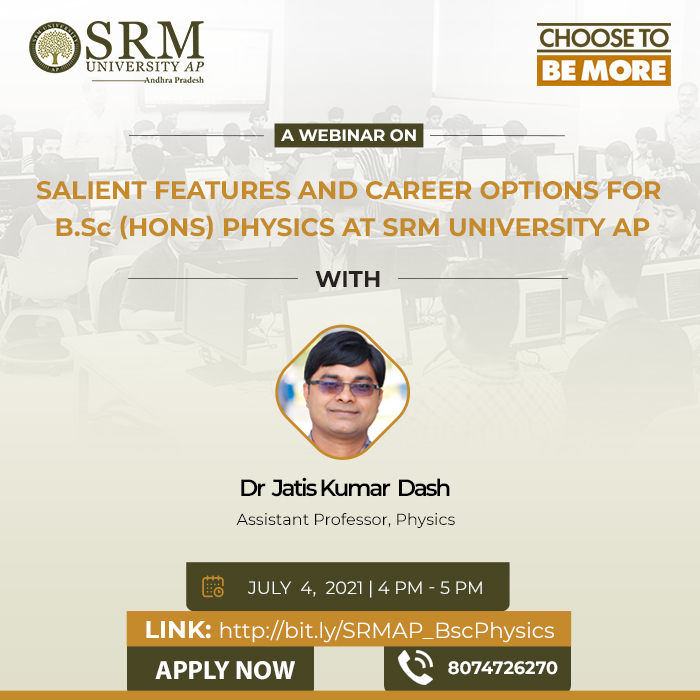 The department of Physics at SRM University-AP, Andhra Pradesh offers an interdisciplinary BSC (Hons) programme that provides practical training to students on the model and design solutions. In the interactive webinar titled “Salient Features and Career Options for BSc (Hons) Physics at SRM University AP”, Dr Jatis Kumar Dash, assistant professor from the Department of Physics will explicate the career options and higher education opportunities of BSc Physics on July 04, 2021, at 4.00 pm.
The department of Physics at SRM University-AP, Andhra Pradesh offers an interdisciplinary BSC (Hons) programme that provides practical training to students on the model and design solutions. In the interactive webinar titled “Salient Features and Career Options for BSc (Hons) Physics at SRM University AP”, Dr Jatis Kumar Dash, assistant professor from the Department of Physics will explicate the career options and higher education opportunities of BSc Physics on July 04, 2021, at 4.00 pm.Students pursuing BSc Physics at SRM University-AP receive support to conduct research in a wide range of fields including fabrication of two-dimensional materials and their electronic devices, material genomics, applied photonics and optical communications, piezoelectricity and ferroelectricity, high-k dielectrics, thermoelectric devices, molecular electronics, photovoltaic devices and energy applications.
To know more about the programme/course structure, selection process, research areas, career options, and higher education opportunities of BSc Physics, join this immersive webinar on July 04, 2021, at 4.00 pm.
Register here: https://srmap.zoom.us/webinar/register/WN_-I3piSBCRNCUkjQHTtC4Mg
Continue reading → - Prof Puru Jena enlightens on “Beyond the Periodic Table of Elements” June 3, 2021
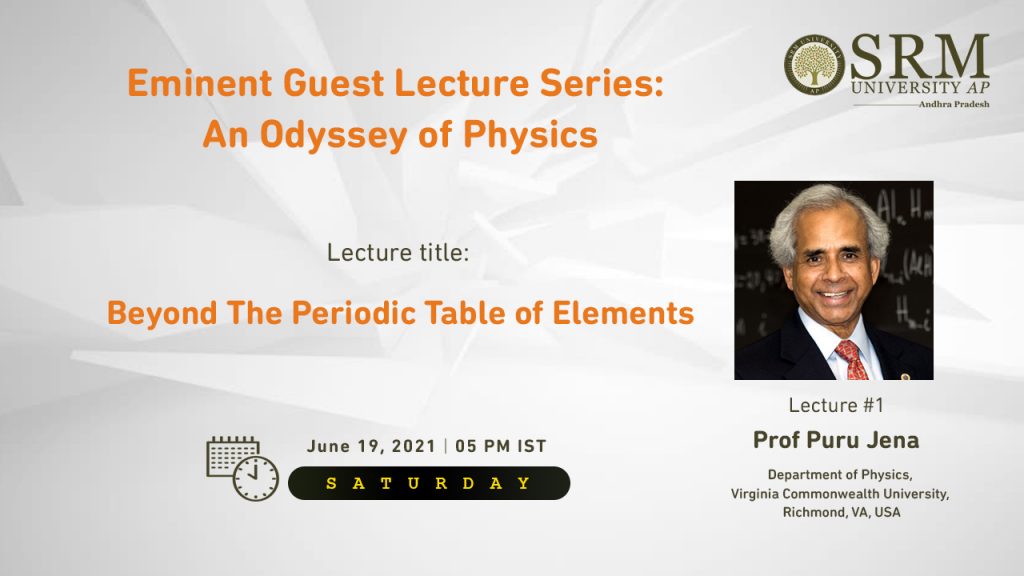 The Department of Physics, SRM University-AP, Andhra Pradesh, organizes a continual online and offline Lecture Series entitled “Eminent Guest Lecture Series: An Odyssey of Physics” to understand the recent advances and future developments in the field of Physics and allied sciences. The first seminar of this lecture series, on the theme Beyond the Periodic Table of Elements is scheduled to be held on June 19, 2021 at 5.00 pm (IST). Prof Puru Jena, distinguished Professor of Physics at Virginia Commonwealth University, USA will enlighten and engage the session with his extensive knowledge and expertise in the domain.
The Department of Physics, SRM University-AP, Andhra Pradesh, organizes a continual online and offline Lecture Series entitled “Eminent Guest Lecture Series: An Odyssey of Physics” to understand the recent advances and future developments in the field of Physics and allied sciences. The first seminar of this lecture series, on the theme Beyond the Periodic Table of Elements is scheduled to be held on June 19, 2021 at 5.00 pm (IST). Prof Puru Jena, distinguished Professor of Physics at Virginia Commonwealth University, USA will enlighten and engage the session with his extensive knowledge and expertise in the domain.Abstract: The periodic table created by Mendeleev in 1869 is the mother of all materials. The realization that the physics and chemistry of materials at the nanoscale can be very different from their bulk and that their properties in small clusters can be tailored one atom at a time led to the hypothesis, more than twenty years ago, that stable atomic clusters with specific size and composition and mimicking the chemistry of atoms can be designed and synthesized. These clusters, known as superatoms, can form the building blocks of a new three-dimensional periodic table as well as a new class of cluster-assembled materials. In this talk, Dr Puru Jena will outline the considerable progress that has been made over the years by focusing on superalkalis and superhalogens, which mimic the chemistry of alkalis and halogens, respectively and can be used to form supersalts with uncommon properties. The ionization energies of superalkalis are less than those of alkali atoms while the electron affinities of superhaloegns are larger than those of halogen atoms. He will present examples where these superions are used to promote unusual chemistry making noble gas atoms form chemical bonds at room temperature, superhalogens forming halogen-free electrolytes in Li-ion batteries, superalkalis as building blocks of new electrides where the electron is completely detached from the host and remain localized pretending to be an anion without a nucleus, superhalogens as building blocks of multiferroic materials, and supersalts capable of enhancing the Curie temperature of 2D materials. The synergy between first principles theory and experiments in advancing our understanding of matter at the nanoscale will be highlighted.
About the Speaker: Dr Puru Jena is a Distinguished Professor of Physics at Virginia Commonwealth University and received his Ph. D. in Physics from the University of California at Riverside. He also served as Program Director at the National Science Foundation and as Jefferson Science Fellow and Senior Science Advisor at the US Department of State. Dr Jena’s research covers a wide range of topics in Nano-structured Materials, Condensed Matter Physics, and Materials Science. These include structure and properties of metals, semiconductors, superconductors, alloys, liquid metals, point and complex defects, surfaces, thin films, atomic clusters, and cluster assembled materials. His current research is focused on three major areas: Structure and properties of nano-clusters and cluster assembled materials (0 D), nanotubes and nanowires (1D) and mono- and multi layered materials (2D) with emphasis on energy storage; electronic, magnetic, and optical properties. Dr Jena is the author of nearly 630 papers including 14 edited books with Google citations and H index at 31,300 and 88, respectively. He has given over 425 invited talks in international conferences and academic institutions in 29 countries around the world and has organized 50 international conferences. He has received over $15 million dollars of funding from federal agencies such as the Department of Energy, Department of Defense, National Science Foundation, and NASA. His many honours include being the Fellow of the American Physical Society; Outstanding Scientist of Virginia; Outstanding Faculty of Virginia; Presidential Medallion, University Award of Excellence, and Outstanding Scholar from Virginia Commonwealth University. He has served as a member of numerous scientific panels including on the Presidential Commission on bilateral scientific collaboration between USA and Russia.
We welcome you to actively participate in this scholarly lecture series on 19 June 2021 at 5.00 pm (IST). For more details and registration, kindly visit the links given below:
Registration Link: https://srmap.zoom.us/webinar/register/WN_MV36TDJ1Tw6MuuG7ep8BcA
Know more about Prof Jena: https://physics.vcu.edu/jenasgroup/
Continue reading → - “National Symposium on High Energy Physics”-enthralling discussion on Particle Physics, Dark Matter and gravitational waves April 29, 2021
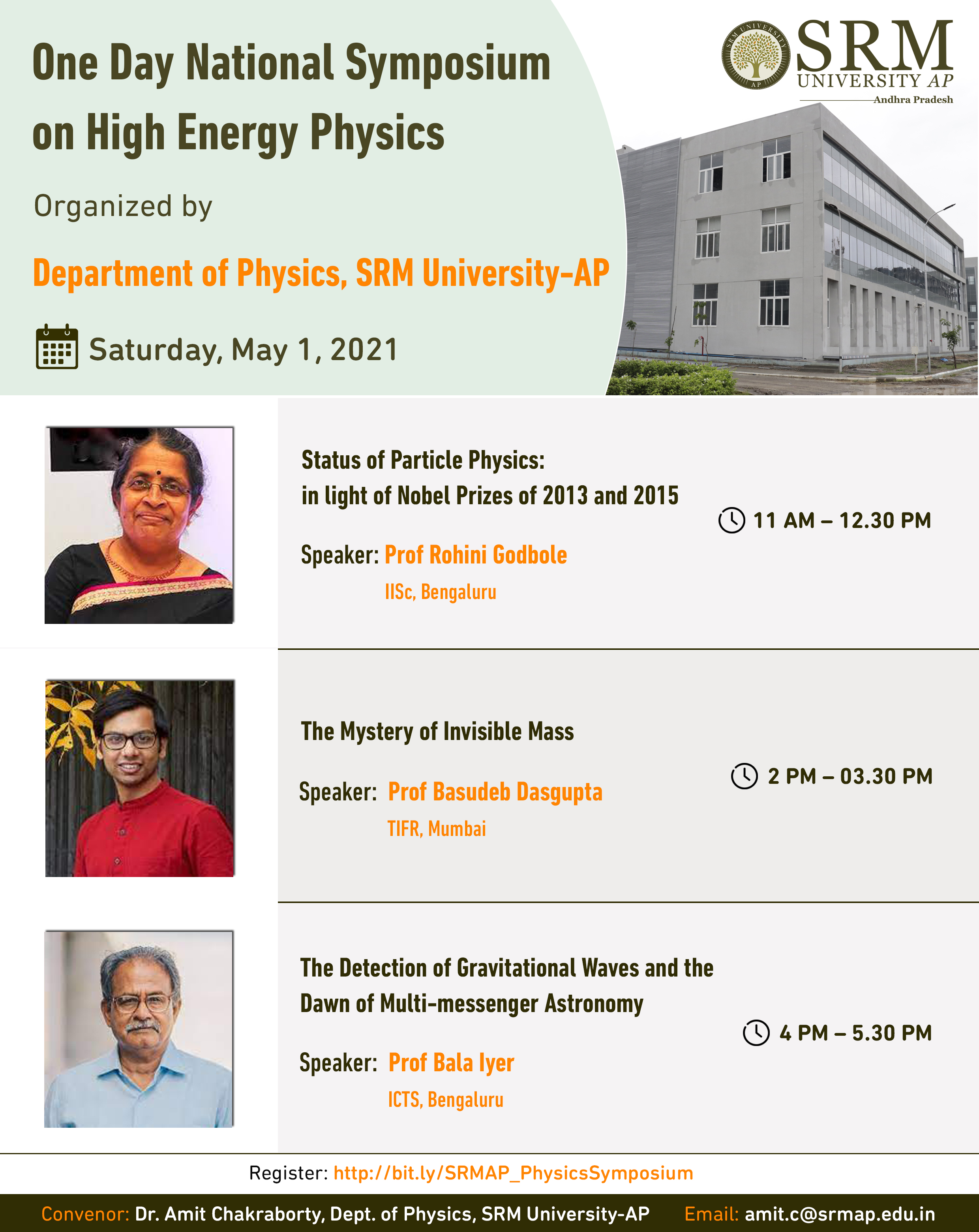 The Department of Physics, SRM University-AP, Andhra Pradesh, has organised a National Symposium on High Energy Physics on Saturday, May 1, 2021, at 11 am. Leading Physicists of the nation are going to share their perspective on the progress and recent challenges in Particle Physics, Dark Matter Physics and Gravitational-Wave Astronomy. Padma Shri awardee Prof Rohini Godbole, theoretical particle physicist at the Indian Institute of Science (IISc), Bengaluru, will present the inaugurating talk on “Status of Particle Physics: in light of Nobel Prizes of 2013 and 2015”. Prof Basudeb Dasgupta from the Tata Institute of Fundamental Research (TIFR), Mumbai, will join us for the next session on “The Mystery of Invisible Mass”. The last talk of the day will be given by Prof. Bala Iyer from the International Centre for Theoretical Sciences (ICTS), Bengaluru. He will shed light on “The Detection of Gravitational Waves and the Dawn of Multi-messenger Astronomy”.
The Department of Physics, SRM University-AP, Andhra Pradesh, has organised a National Symposium on High Energy Physics on Saturday, May 1, 2021, at 11 am. Leading Physicists of the nation are going to share their perspective on the progress and recent challenges in Particle Physics, Dark Matter Physics and Gravitational-Wave Astronomy. Padma Shri awardee Prof Rohini Godbole, theoretical particle physicist at the Indian Institute of Science (IISc), Bengaluru, will present the inaugurating talk on “Status of Particle Physics: in light of Nobel Prizes of 2013 and 2015”. Prof Basudeb Dasgupta from the Tata Institute of Fundamental Research (TIFR), Mumbai, will join us for the next session on “The Mystery of Invisible Mass”. The last talk of the day will be given by Prof. Bala Iyer from the International Centre for Theoretical Sciences (ICTS), Bengaluru. He will shed light on “The Detection of Gravitational Waves and the Dawn of Multi-messenger Astronomy”.Our first speaker of the day, Prof Rohini M Godbole, is a theoretical particle physicist at the Indian Institute of Science, Bangaluru. Over the past three decades, she has worked extensively on particle physics phenomenology, exploring different theoretical aspects of Standard Model and Beyond Standard Model physics at high energy collider experiments. She is an elected fellow of all the three Academies of Science of India and the Science Academy of the Developing World (TWAS). She has published over 200 research papers and received numerous recognitions from all over the world. Prof Godbole co-edited the book “Lilavati’s Daughters”, a collection of biographical essays on women scientists of India, which was published by the Indian Academy of Sciences. In 2019, she was awarded Padma Shri, the fourth highest civilian honour of the Government of India, for her contribution to Science and Technology.
In 2013, the Nobel prize in Physics was awarded for the theoretical postulate of the Higgs Boson, after the experimental discovery of the same at the LHC in 2012. This was considered being the last missing piece in the periodic table of the Standard Model (SM). In 2015 the Nobel prize in physics was awarded for the experimental discovery of Neutrino oscillations, which is one robust evidence for physics beyond the SM. In her speech, Prof Godbole will comment on the status of particle physics in light of these two and the exciting results on the measurements of the magnetic moment of the muon that have been announced in the previous weeks.
Prof Basudeb Dasgupta is a theoretical physicist at the Tata Institute of Fundamental Research (TIFR), Mumbai. His research interests include the interfaces of particle physics, astrophysics, and cosmology with an emphasis on dark matter and neutrino physics. Prof Dasgupta is also the Leader of the Astroparticle Physics Partner Group of Max-Planck Institute for Physics. Prof Dasgupta is a regular speaker at notable international workshops and conferences and different Science Outreach programmes.
When we look at the night sky, we see a variety of astronomical objects, such as planets, stars, gas clouds, still waiting to form stars to swathe of the emptiness. For a long time, it was believed to be all that the Universe is consists of. The following discoveries came as a huge surprise that all we see and know comprises only about 20% of the matters in the Universe. The remaining 80% is invisible and called “Dark Matter.” What is this dark matter? How do we know that is out there? What is it made of? How can we decipher the nature of this mysterious new ingredient of the cosmic soup? In this talk, Prof Basudeb Dasgupta will address and answer some of these questions.
Prof Bala Iyer is currently the Simons Visiting Professor at ICTS-TIFR Bangalore and CO-PI of the LIGO-India Scientific Collaboration. The alumnus of Bombay University previously worked at the Raman Research Institute, Bangalore, on Astrophysical applications of General Relativity, Perturbation methods and Black Holes. Since 1990, he is working on calculations of Gravitational waves from inspiraling binaries of neutron stars and black holes. He is a Fellow of the American Physical Society and International Society on General Relativity and Gravitation. He has been the Chair of the IndIGO Consortium since its inception in 2009. Prof Iyer was a Member of the Core Team for the LIGO-India Mega-Project Proposal. Further, he is the Chief Editor and Subject Editor of Gravitational Waves for the Online Journal `Living Reviews in Relativity’, published recently by Springer. Prof Bala Iyer has been a Visiting scientist in France, UK, Germany, USA. He has been involved in REAP (Research Education Advancement Programme) for B.Sc students at the Bangalore Planetarium for over two decades and Public outreach on General Relativity and Gravitational Waves.
The first detection of gravitational waves from a black hole binary in 2015 was a breakthrough, taking a century to realise, and made possible by the coming together of a remarkable experiment and an exquisite theory complemented by the best in sophisticated data analyses, state of the art computing and the transition to “big science”. 2017 brought the discovery of gravitational waves from a neutron star binary. The intense associated electromagnetic follow up of this event was spectacular. It heralds the launch of a new multi-messenger astronomy with the potential to impact astrophysics, cosmology and fundamental physics in the coming decades. Prof Bala Iyer will discuss the nature of gravitational wave and its impact on Physics.
The symposium aims to make students aware of the current status of some of the fascinating research topics of High Energy Physics. Students of basic sciences and engineering streams will be highly inspired and motivated after attending the symposium and listening to the talks. Join the captivating event on May 1, 2021, at 11 am.
Register: Click on this link to register for the Symposium
Continue reading → - Third international conference at SRM University AP, Andhra Pradesh campus February 7, 2020
Asian Consortium on Computational Material Sciences-International Conference on Material Genome (ACCMS-ICMG) and Fracmeet Conference
The campus welcomes international and national researchers along with members of ACCMS and Fracmeet organizations to take part in two parallel international conferences hosted by SRM University AP, Andhra Pradesh on 5th-7th February, 2020. The 3-day conference was inaugurated by the guests, Prof. Yoshiyuki Kawazoe, Tohoku University, Japan, Dr. Purusattam Ray, IMSc, Chennai, Dr. D. Gunasekaran, Registrar, Dr. B. Sivakumar, Deputy Registrar, and Prof. Durga Rao, Dean-SLABS. ACCMS-ICMG 2020 Convener, Prof. Ranjit Thapa, Department of Physics, and Fracmeet 2020 Convener, Dr. Soumyajyoti Biswas, Department of Physics, initiated the launch of the abstract book by the guests and dignitaries to begin the conference.
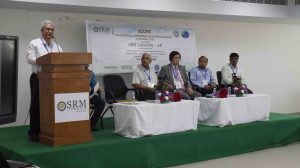 Dr. D. Gunasekaran, Registrar, addressing the audience on the inaugural event of ACCMS & Fracmeet conference.
Dr. D. Gunasekaran, Registrar, addressing the audience on the inaugural event of ACCMS & Fracmeet conference. Dr. Gunasekaran welcomed all the guests and addressed the audience. He introduced the university by recalling its infrastructural dominance, mentioning the eminent faculty, and discussing the collaborations with the University of California, Berkeley where students are sent for semester abroad programs. He also emphasized on the exposure offered to the students through international and national internships. “Our university encourages the young researchers through UROP where the students individually or in a group take up mini-projects under the guidance of our faculty. “Our faculty has published more than 120 journals in the last one year, along with 23 sponsored projects and 64 proposals that await funds from the agencies. SRM University AP, Andhra Pradesh is also collaborating with Indian Railways to build Hydrogen Trains, and Amara Raja Group on Energy Storage”, Dr. Gunasekaran pronounces. He also expresses his gratitude to the distinguished guests and assures to extend extensive support from the university’s end.
The Asian Consortium on Computational Materials Science (ACCMS) was set up in 2000 to promote research and development activities in computational materials in Asian countries. Prof. Yoshiyuki Kawazoe says “Computational materials was not a coined term in Japan when we started off this organization 20 years back. We merely had 7-8 participating nations who met on virtual platforms regularly or at conferences once in a while. In order to optimally utilize our resources and manpower, it is widely felt that we should have a ‘real’ organization to steer young researchers towards computational research. It is envisaged that the conduct of the International Conference on Material Genome at SRM University AP, Andhra Pradesh will lay the foundation for an active center of ACCMS on campus.”
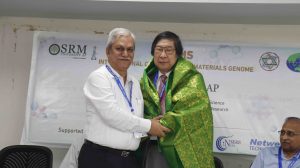 Prof. Yoshiyuki Kawazoe and Registrar at the opening of the conference.
Prof. Yoshiyuki Kawazoe and Registrar at the opening of the conference. 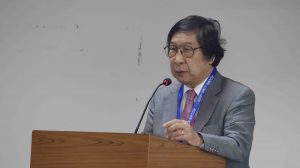 Prof. Yoshiyuki Kawazoe addressing the audience.
Prof. Yoshiyuki Kawazoe addressing the audience. He further addresses that the purpose of ACCMS is to solve large probabilistic problems through Quantum Mechanics based calculations followed by Machine Learning (QM/ML). “We are aiming at developing language and characters prior to the western nations and secure a superior position for Asian countries”. Few themes to be covered in this chapter of ACCMS conference includes “Machine Learning for materials”, “High-throughput Computation”, “Polar Magnetic Materials”, “Thermoelectric Materials”, etc.
Fracmeet conferences are being organized for over a decade to focus on an aspect of Material Science – “Mechanical Properties of Complex Materials.” The multidisciplinary collaborative meetings of this organization welcome scholars from Chemistry, Physics, and Engineering domains, along with people from the industry. Prior to this, the annual conferences and meetings of Fracmeet were held at IMSc., Chennai, where Fracmeet was initiated. For the first time, SRM University AP, Andhra Pradesh, having exceptional infrastructure and facilities, is hosting this conference in collaboration with IMSc. This year, Fracmeet is aiming at discussing “Micromechanics of failure in disordered material” in this conference.
 Dr. D. Gunasekaran, Registrar, Dr. B. Sivakumar, Deputy Registrar with the convener, Dr. Purusattam Ray.
Dr. D. Gunasekaran, Registrar, Dr. B. Sivakumar, Deputy Registrar with the convener, Dr. Purusattam Ray. The conferences will be held in parallel sessions for 3 days, from 5th to 7th February 2020, where delegates will be presenting their papers and discussing important issues to develop unique solutions for addressing challenges.
Continue reading →For more details, please visit: https://srmap.edu.in/accms-2020/


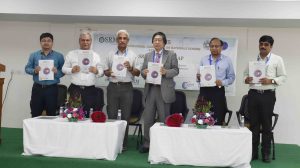 Abstract Book launch by dignitaries.
Abstract Book launch by dignitaries.